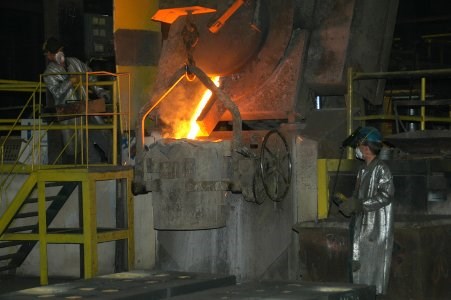By Andrew Low and Ian Ross
Northern businesses are experiencing first hand the affects of American rising protectionism against Canadian companies.
President Barack Obama's visit to Canada was intended to quell the fears and show Canadian counterparts that U.S. intends to abide by NAFTA obligations.
However, Obama's new American Recovery and Reinvestment Act includes a section that stipulates all iron, steel and manufactured goods funded through the stimulus funding project must be sourced domestically.
“Clearly, we have a have a serious issue,” said Wabi Iron and Steel Corporation president Peter Birnie, who adds that 50 per cent of their exports go into the States.
"This is a material part of our business. It is so important to have access to these infrastructure projects.”
Wabi supplies Hayward Gordon, a Halton Hills based company located near Brampton, with pump casings they sell to the United States, but since discriminatory action has been taken on Canadian companies, Hayward Gordon is being shut out of the American market.
“I think these issues are going to come up a lot more often,” said Jayson Myers, president of Canadian Manufacturers and Exporters (CME) who is concerned that such protectionism is appearing in more American legislation than ever before.
For instance, 250 companies across Canada will be affected by the restrictions in the Water Quality and Investment Act, under the 'Buy American' policy. The Act is before the the U.S. Senate and The Water and Wastewater Equipment Manufacturers Association Inc. in Washington D.C. have aligned with Canadian manufacturers and are publicly taking a stand against Buy American policies.
CME has been making trips to Washington to plead their case. Now some private company leaders will be following. Birnie is one of them.
“Americans have to understand that trade is a two-way street,” said the New Liskeard company president. “If Americans want to go down this road, there are going to be more employees negatively affected by this in the United States and more employees in all industrial economies around the world.”
“Fair trade creates job on a large scale. Free Trade is often not balanced.”
In Parry Sound, George Seehaver of Pro Safe Fire Training Systems is feeling the affect of Buy American policies as well.
Seehaver wants to staff up his six-employee workforce at their shop at the Parry Sound airport, but he's being prevented by the self-imposed protectionist measures being taken by many of the U.S. municipalities that he markets his fire training equipment to.
“We're hurting big time,” said Seehaver.
Most of their propane-fueled training simulators are shipped to the U.S., particularly to military clients and municipal and volunteer fire departments.
“The rumours of the 'Buy American' policy, the people are buying into it big time and that's hurting manufacturers.”
Seehaver said many U.S. companies are following into the spirit of the 'Buy American' slogan as a means to take advantage of government infrastructure stimulus dollars.
“It's stuck in the mind of the buyer he's going to buy American and it's a big push,” he said.
Though the company continues to bid on U.S. projects, many tendering process appear to be adjusted to favour American bidders. Though Seehaver said he's never been told their bids are rejected because they were a Canadian firm.
“They don't say it directly,” said Seehaver.
It's especially evident at the municipal level where tender awards are made by local councillors and purchasers for a city that can wield great influence.
"We've been awarded contracts and been told afterwards there's just been an uproar at council, because we were a Canadian supplier and they were pushing Buy American big time,” he said.
Though Seehaver's company has support from repeat customers who love its product, Buy American restrictions have the potential to hurt business in the near future, given the two-year time window from the point of contract bidding to equipment completion.
In early June, the Town of Halton Hills' council will present a motion to the Federation of Canadian Municipalities to ensure future Canadian infrastructure projects be bought from companies whose countries of origin do not impose local trade restrictions against materials manufactured in Canada.
Myers supports reciprocal action where Canadians stop importing American goods.“The one thing that the Americans do pay attention to is the threat of retaliation,” said Myers.
“It’s saying, 'if you close your markets to us, we’ll close our markets to you.' Clearly, you don’t create opportunity in the midst of a recession by closing off more opportunity.”
Canada is not in a situation where it’s losing all of its ability to trade with the U.S., with most industries still trading normally, said Myers.
“Part of it is the concern that this may happen,” he said. “We’re trying to make sure it doesn’t happen.”
The Buy American provisions come at a particularly bad time, as the recession has led the government to start many infrastructure projects, which are being tendered now.
“There is a market opportunity out there and it’s because of all of this new investment in infrastructure and the Buy American provisions would, to all intents and purposes, cut Canadian exporters out of the $100 billion of spending so far allocated to public works,” said Myers.
“The impact could be pretty far reaching,” he added.
The Buy American policies first appeared in United States's Economic Recovery Act in February.




